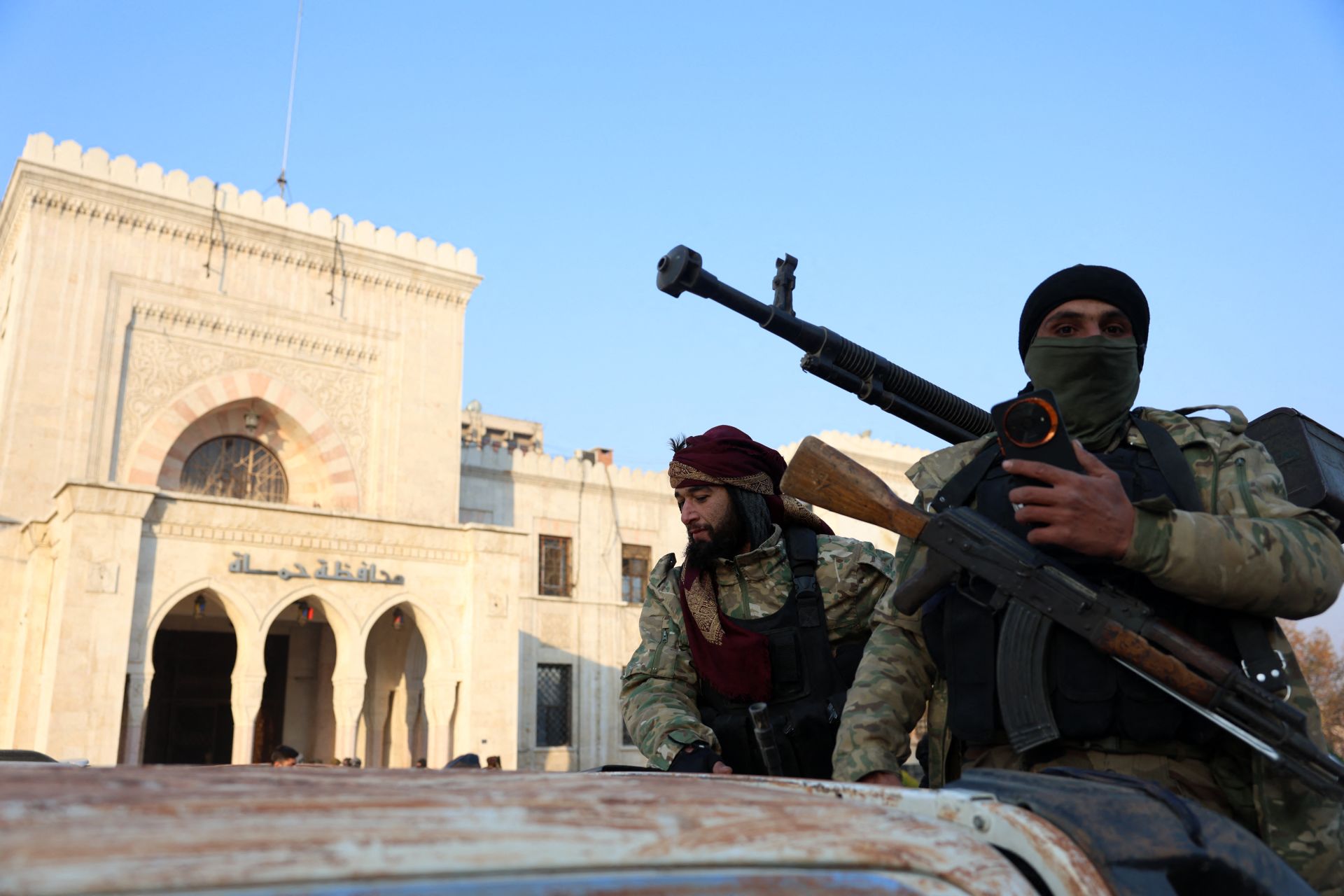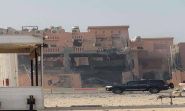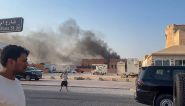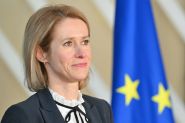- Home
- Middle East
- Turkey, Russia and Iran Meet in Doha Seeking Exit From Syria Chaos

HTS fighters patrol in Hama, a day after rebels captured the central-west city, on December 6, 2024. ©Mohammed AL-RIFAI/AFP
The top diplomats from Iran, Turkey and Russia met in Qatar on Saturday for talks on Syria, where rebel forces have taken parts of the country in a lightning offensive.
After the discussions in Doha with his Russian and Turkish counterparts, Sergei Lavrov and Hakan Fidan, Iranian Foreign Minister Abbas Araghchi said the parties agreed on the initiation of "political dialogue between the Syrian government and the legitimate opposition groups".
The three countries have been involved since 2017 in the so-called Astana format talks seeking a political settlement in Syria.
However, the situation in the country has changed dramatically in recent days after rapid gains by Islamist-led rebel forces who oppose Iran-backed Syrian president Bashar al-Assad.
On Saturday, a commander with the Islamist-led alliance that launched the new offensive said "our forces have begun the final phase of encircling the capital", though the Syrian defence ministry said "there is no truth to news claiming" the army had withdrawn from positions near Damascus.
Ahead of the meeting, Araghchi said he had "very frank and direct" talks with his Turkish counterpart and the Emir of Qatar, Sheikh Tamim bin Hamad Al-Thani.
Turkish President Recep Tayyip Erdogan, who this week called on Assad to "reconcile with his people", said Friday he "hoped the advance of the rebels would continue without incident", identifying Damascus as their objective.
Qatar, meanwhile, supported the rebels at the start of the Syrian civil war in 2011, but is now calling for a negotiated end to the conflict.
On November 27, a coalition of rebels led by the Islamist group Hayat Tahrir al-Sham (HTS) launched an offensive from its stronghold in Idlib, seizing dozens of localities and the strategic cities of Aleppo and Hama, among others.
Araghchi said during a joint press conference with his Iraqi and Syrian counterparts in Baghdad on Friday that the offensive in Syria poses a "threat" to the whole Middle East.
"This threat will not be limited to Syria and will affect Syria's neighboring countries such as Iraq, Jordan, and Turkey," he added.
"For Ankara, there is both opportunity and risk in Syria's changing balance of power," said Hamish Kinnear, an analyst at consultants Verisk Maplecroft.
Turkish President Recep Tayyip Erdogan, who this week called on Assad to "reconcile with his people", said Friday he "hoped the advance of the rebels would continue without incident", openly identifying their objective as Damascus.
Turkey is no simple bystander, sharing a 900-kilometer (560-mile) border with Syria and hosting nearly three million Syrian refugees.
For the moment, "the precise role of Turkey in this situation remains a topic of speculation," said Omer Ozkizilcik, a researcher in Ankara linked to the Atlantic Council.
"But what is clear is that without being directly involved, Turkey gave its green light to the offensive," he said.
'Complicated relations'
Even if Ankara's relations are traditionally "complicated" with the Islamist group Hay’at Tahrir al-Sham (HTS) spearheading the offensive, the Turkish government was clearly aware of the preparations, Ozkizilcik added.
The most important thing for Turkey "is stability in Syria and a safe area to which Syrian refugees can return," said Gonul Tol, Turkey director of the Middle East Institute in Washington.
Erdogan is no longer insisting on the full removal of the Assad regime which would create a void that would benefit the Islamic State group and Kurdish militants, she said.
Assad has rejected Erdogan's recent attempts to meet, insisting that beforehand Turkish forces must leave the northwest of Syria, where they are deployed to fight Kurdish forces.
Assad's refusal to meet Erdogan has even irritated Russian President Vladimir Putin, Tol said.
Power vacuum
"Assad managed to piss everyone off, including Iranians and Russians and Turks, everyone, because he has been dragging his feet on efforts to reach a deal with both Turkey and others," she said.
Turkey and Russia could seek to promote a transition government without Assad but with some elements of his regime and the opposition, she said.
Iran, for its part, is irked by the lack of support shown by Assad after the death of Hezbollah leader Hassan Nasrallah, whose forces had come to Assad's aid during the civil war.
The Qatar meeting, which brings together Russia's Sergei Lavrov, Turkey's Hakan Fidan, and Iran's Abbas Araghchi, could signal the end of Assad in power, the experts say.
As a former head of Turkish intelligence, Fidan is well versed in Syrian affairs and knows all the key players, said Sinan Ulgen, an analyst with Carnegie Europe in Ankara.
With AFP
Read more



Comments